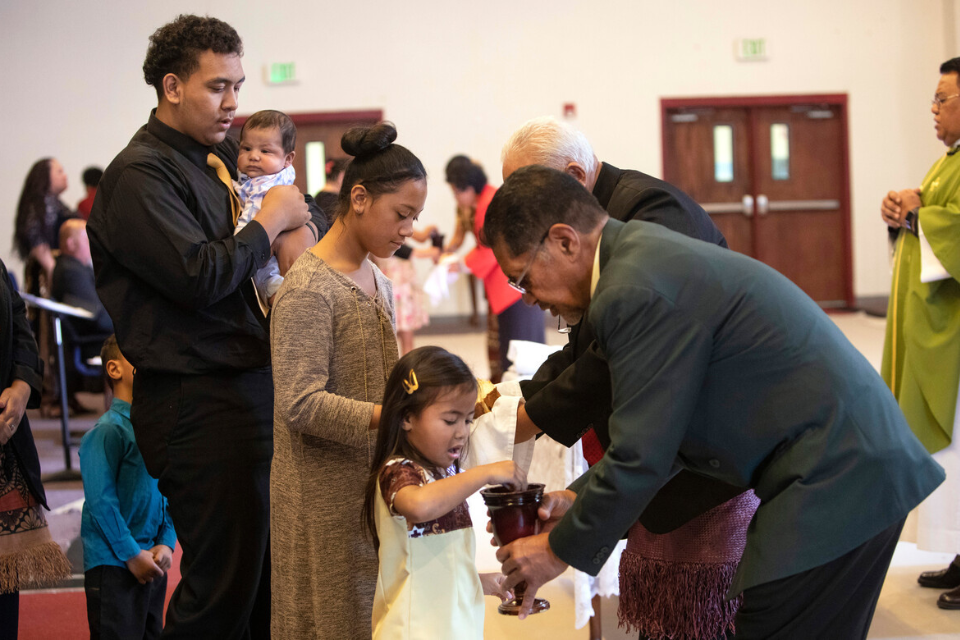The commemoration of World Communion Sunday serves as an opportunity to appreciate the redemptive work of Christ on the cross as we embody Christlike empathy and compassion in our response to others.
REV. FAITH TIMMONS
Elder, Michigan Conference
“I therefore . . . beg you to lead a life worthy of the calling to which you have been called, with all humility and gentleness, with patience, bearing with one another in love, making every effort to maintain the unity of the Spirit in the bond of peace. There is one body and one Spirit, just as you were called to the one hope of your calling, one Lord, one faith, one baptism, one God and Father of all, who is above all and through all and in all” (Ephesians 4:1-6).
More than any other time in recent history, the practice of partaking in Holy Communion has been quite different, for lack of a better word. Due to concerns about the coronavirus, social distancing still has some of us spending more time apart than gathered or worshiping in private spaces rather than in person. I sincerely believe that through World Communion Sunday, God invites us to embrace those challenging circumstances as opportunities to foster a genuinely compassionate Christian community.
The ebb and flow of the pandemic has impacted us all, and that collective experience is serving to connect us globally in new ways. When we share any experience, good or bad, like the pain of the pandemic, God can use it all for the ultimate good. Yet sometimes, we must be the ones to allow it.
There are days when my disillusionment creeps in, and I desperately need to remind myself to look anew at one of my favorite Bible verses, Romans 8:28: “We know that all things work together for good for those who love God, who are called according to God’s purpose” (NRSV).
World Communion Sunday, 2022, can serve as a powerful example. The very purpose of this day is to demonstrate our unity and togetherness in Christ. Due to its very nature, this pandemic is an unforgettable demonstration of our oneness and interconnectedness as people. Interestingly, interconnectedness is also at the center of World Communion Sunday and the purpose for which it began.
Acknowledging our shared human suffering can and should cultivate compassion throughout the entire church, as one body in Christ (Romans 12:5). Compassion means “to suffer with,” or quite literally, “to suffer together.” So, as uncomfortable as it may be, suffering serves a valuable purpose.
It’s often said that what doesn’t break us can make us. It’s my prayer that we will allow our present circumstances—be it pain, confusion, illness, violence, war, injustice, terrorism, global warming, diminishing resources, or otherwise—to not only make us but re-make us, transforming us into the very image and likeness of Jesus Christ.
The Christlike characteristics of empathy and compassion only develop as we learn to identify with Christ’s suffering and that of others. Suffering can sometimes accomplish what nothing else may. In other words, sometimes we must go through it in order to do it. Maybe that’s why the apostle Paul carefully noted this timeless character-building process step-by-step in Romans chapter 5: “We . . . [know] that suffering produces endurance, and endurance produces character, and character produces hope, and hope does not disappoint us” (vv. 3-5).
No matter what you’re facing, please don’t let disappointment or disillusionment get the best of you. Consider the commemoration of World Communion Sunday as an opportunity to appreciate the redemptive work that Christ accomplished through his suffering on the cross.
Also, please remember that as creatively festive as our presentations of the Lord’s Supper on World Communion Sunday often were in the past, the pandemic presents us with the equally necessary opportunity to reflect deeply upon the suffering of our Lord and Savior, Jesus Christ, and what that signifies.
Finally, for three years now, clergy and laity in congregations around the world have painstakingly adapted and readapted to ensure that all who are invited to the communion table can partake of the sacraments safely and sanitarily. Yet, do not forget to pray for and encourage those who’ve been unable to receive the elements publicly, either for the sake of protecting vulnerable loved ones, preserving their health, or out of concern for the community as a whole. Perhaps they have had their unspoken encounters with suffering and sacrifice.
And you know what? Rest assured, all of these uncomfortable experiences that we have shared with the church abroad can serve to unite us for the making of a more compassionate community.
Will you pray with me?
Precious God, as we prepare to gather for World Communion Sunday, in whatever forms we do, help us celebrate the shared experiences that unite us far more than focusing on the difference that often divides us. Help us to recall that we are one in Christ, with one God and one Spirit. We are one body. While painful, this current season presents us with the unique opportunity to acknowledge and experience the truth that when one member of the body hurts, we all hurt. May that hurt help us not only identify with the suffering and death of Jesus Christ but move us to emulate the character of our risen Lord and Savior more closely. May your divine direction lead us to a new level of humility and a deeper level of compassion as the church universal. In Jesus’ name, we pray. Amen.
—Rev. Faith Timmons is an ordained elder and a member of the Michigan Annual Conference. She spent time as a journalist before pursuing full-time ministry. Her husband, Rev. Greg Timmons, serves the Flint: Calvary-Hope Cooperative Parish. Together they have two children, Gregory and Olivia.
Last Updated on October 4, 2022

